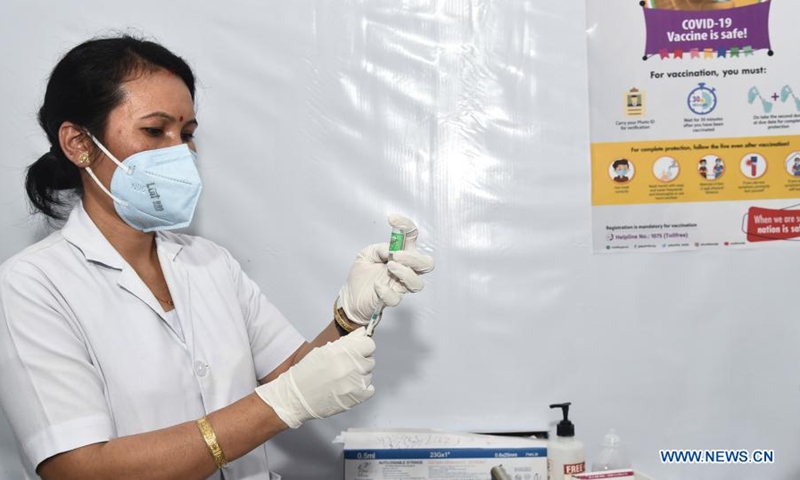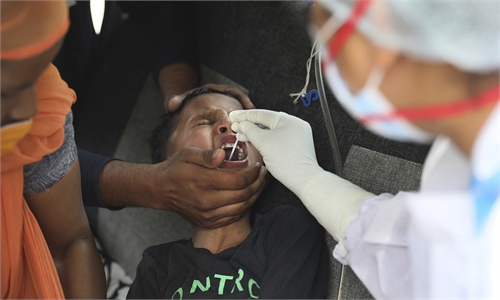CORONAVIRUS
India’s ‘double mutant’ COVID-19 variant raises alert, faster vaccinations needed

A health worker prepares a shot of COVID-19 vaccine in Gauhati, India, March 1, 2021. The phase 2 of the ongoing COVID-19 vaccine drive began in the country on Monday. The phase 2 of the vaccination drive would inoculate those above the age of 60 and those over 45 with comorbidities.(Photo: Xinhua)
The Indian health authority announced on Wednesday that a new "double mutant" variant of the COVID-19 has been found in the country, raising concerns over whether the unique variant would be more infectious and could reduce efficacy of existing COVDI-19 vaccines.
Facing the recent infection spike in India, Chinese experts suggested that people should be alert to the "double mutant," which was found in the vital spike protein of the coronavirus, and will be more risky in terms of helping the virus escape the immune system.
Although more studies are still required to determine the impact of the mutation, what India needs to do is prevent the variant from spreading and accelerate vaccinations, they said.
The two mutations are E484Q and L452R, the genome sequencing detected by the Indian SARS-CoV-2 Consortium on Genomics (INSACOG), a group of 10 labs across the country.
They were found in about 15-20 percent of the samples from the worst-hit western state of Maharashtra, the Indian Ministry of Health and Family Welfare announced Wednesday.
Such mutations confer immune escape and increase infectivity," the ministry added.
Zhuang Shilihe, a Guangzhou-based COVID-19 vaccines expert, told the Global Times on Thursday that the L452R mutation was first discovered in California in early January, and preliminary research suggested that it escapes the immune system. Mutant E484Q is similar to a variant found in South Africa and Brazil, which could reduce neutralization by the serum from coronavirus survivors by ten-fold.
"Given that the AstraZeneca vaccine was previously found to be significantly less effective against the mutant strains in South Africa, it could be inferred that the vaccine's effectiveness against the 'double mutant' coronavirus in India might also be impaired," said Zhuang.
However, more research needs to be done before jumping to conclusions, experts noted.
The double mutant variant accounts for a small proportion of all strains. India should focus more on prevention measures against the epidemic, Zhuang said.
India, one of the major COVID-19 vaccine exporters, is now facing a new surge of COVID-19 cases nationwide and is mulling to shift its focus to domestic demand, reports said.
The Health Ministry reported on Thursday morning that the country saw 53,476 new coronavirus infections in one day, the highest single day rise this year, with the total exceeding 11.78 million.
India has sent 60.4 million doses of coronavirus vaccines to 80 countries. But faced with rising infections domestically, it is unlikely to expand exports of COVID-19 vaccines for the next few months, Indian media reported.
Citing two resources, Reuters reported Thursday that India has temporarily suspended all major exports of the AstraZeneca COVID-19 vaccine manufactured by the Serum Institute of India.
India in January set an ambitious goal to inoculate 300 million of its population, or nearly a quarter of the population, by July, but as of Thursday, it had only administered 53.15 million doses, Health Ministry data shows.
Such a mutation occurred in India because of lax epidemic control measures that failed to curb the epidemic in time and allowed the virus to evolve, Tao Lina, a Shanghai-based vaccine expert, told the Global Times.
"The main task at this moment for India is to bring the epidemic under control with efficient measures and step up inoculation with vaccines at hand," Tao said.
India has two vaccines approved for use--the one developed by AstraZeneca and Oxford University, and the other manufactured by Bharat Biotech.




